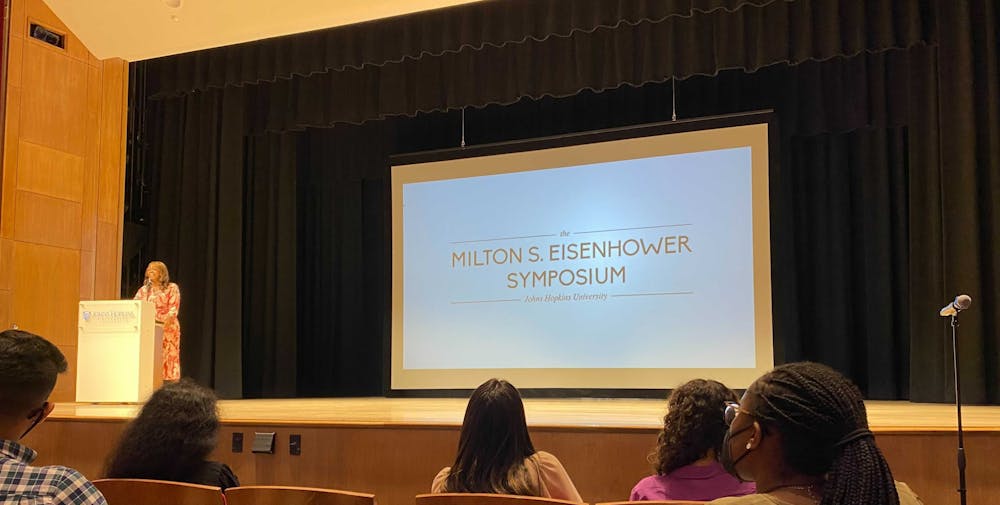The Milton S. Eisenhower Symposium hosted LaTosha Brown last Tuesday for the first event in its “Rebuilding Our Future” series. Brown is a co-founder of the Black Voters Matter Fund (BVM), an organization that works to galvanize Black voters and to stop voter suppression in the South.
Brown opened her speech by imploring the audience to imagine what America would look like without racism. She explained that America will never be a nation without racism if its people are not spending time envisioning what the possibilities could be.
“There is nothing that has been brought into the physical world that has not been first envisioned. Not this cell phone, not this dress I have on, not this pen — everything that has been brought into the physical world has been envisioned first,” she said.
Brown believes that America will eventually stop relying on racism, even though racial inequality is built into our national systems.
“I have the audacity to believe we will win. I know that we will win. But in order for us to win, it’s going to take [courage] to step up and say, ‘We can do something different,’” she said. “We’re talking about what would America look like without racism. That is what we need to be fighting for.”
One topic that Brown touched upon was health care. She questioned why America, the richest country, has the largest number of deaths due to COVID-19 globally.
“We all contributed to this. Because we actually built a system that says ‘how well I do is all that matters, even if it’s [to] someone else’s detriment,’” Brown said. “If you’re the wealthiest nation in the world, why don’t you have the best health-care system? Because of racism and classism,” she said.
Freshman Jade Boateng-Moore attended the event to learn about how to get involved as a Black woman and a new voter. She described her takeaway from the event in an email to The News-Letter.
“I learned that I have to think not on strict party lines but as a human and what my values are, so I can make more conscious decisions,” she wrote.
Brown also talked about BVM and some of its achievements, such as raising and donating $10 million to over 600 Black-led grassroots groups.
She described the Collard Green Caucus, an event organized during the runoff election in Georgia to honor a New Year’s Day tradition for Southern African American households.
“We brought up all the collard greens from all the Black farmers in the state of Georgia and we set up sessions in 50 different counties where we gave out collard greens, black-eyed peas and cornbread,” she said. “People loved it. Some of those folks didn’t need it, but it was affirming [their culture].”
Brown argued that civic and social programs must be tailored to their audience in order to find success.
“You can have the greatest strategy, but if it’s not in line with the culture of that community, it will not go anywhere,” she said. “We use joy, we lean into culture — but we [get] down to the serious business. Folks don’t want people just preaching to them.”
Brown emphasized the message that she and others at BVM are trying to spread to young Black voters is not that these voters “owe” something, but rather that they have power and that they should use that to reclaim their humanity.
She also wanted attendees to, at the very least, take away from her speech a concept she called the “V strategy.” This strategy consisted of five tenets: vision, voice, value, victory and vote.
“People with vision — [meaning] that you are literally using your voice, that you are rooted in this value of something greater than just your own success, that you look at victory in a much more expanded way — when you vote, the entire political landscape shifts,” she said.
Brown closed her speech by imploring her audience to think radically as they picture a new America; one that that is better, bolder and shifting.
“We have an opportunity of a lifetime... [to use] the fullness of your innovation, your intellect and your skills and your talents and your treasures to create the kind of world that all of us can live in — [in which] we’re centering the notion not [on] money or ‘what I have’ or power [but] the love of humanity,” she said. “That’s the kind of world I believe in.”





